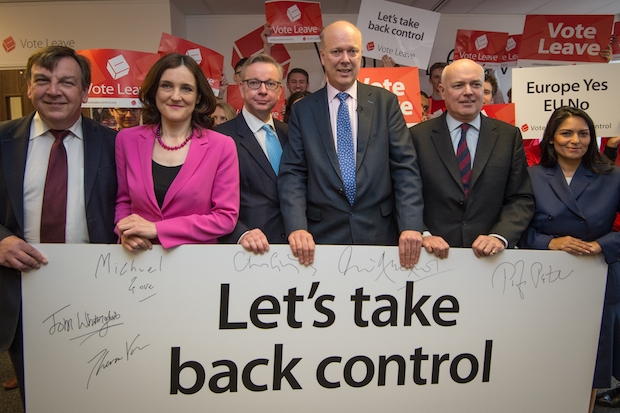In every gathering, someone — often me — calls for a show of hands on Brexit. And I have to report that, in the varied circles in which I move, ‘leave’ may have the best tunes but isn’t winning the argument. At a Mayfair fundraiser for a Jewish charity, the crowd of mostly thirty-to-fortysomething men in suits (and many in yarmulkes) was 90 per cent for ‘remain’; a former Tory minister was spotted waving both arms in a desperate bid to boost the ‘leave’ minority. In a more mixed crowd of business people at a Budget briefing in Newcastle, the balance was much the same.
At a Sunday lunch in Yorkshire — of the traditional sort at which grace is still said — we were six-a-side until the host’s housekeeper paused from serving to make the casting vote for ‘remain’ because ‘my husband’s job depends on it’. Likewise, in a ski party at Méribel, opinion was divided, shading for ‘remain’. At a dinner of European cross-border merger-and-acquisition lawyers, it didn’t seem polite to ask if they wanted the UK to stay or go, so I asked if they thought we’re mad to hold the referendum at all: every hand in the room twitched.
What I draw from all this is that ‘leave’ campaigners, motivated by sovereignty issues and tactically focused on ad hominem attacks, are failing to make the financial case upon which a great block of voters will actually base their choice. Vague talk of trade deals with India and elsewhere just doesn’t cut the mustard. Indeed, if I may say so, the most articulate, broad-ranging economic manifesto for leaving so far was probably our own Spectator Money supplement (5 March and online).
I would have put the in-out question to last Friday’s hunt centenary dinner at home in Helmsley, but by then I felt I could predict the poll: older men for out, older women not so sure, younger people — in business, farming, manual work or higher education — confused by their elders’ contradictory claims, but more likely to vote ‘remain’ if they vote at all.
So I didn’t poll the convivial hunters, instead regaling them with my latest Brexit metaphor. There we are — I told them — late-night tobogganing like teenagers down Méribel’s unlit pistes from the Rond-Point to the Grand Coeur hotel. I’m just swerving on to the final steep descent when what should I meet but the blinding headlights of the very embodiment of the European superstate: a mighty piste-basher machine advancing unstoppably uphill, straight towards me. I hurl myself sideways off my flimsy tea-tray of a toboggan, no match for the giant steel plough ahead, and eventually stagger dazed to my feet. The basher-driver is out of his cab, but is he coming to check I’m unhurt? No, he’s shouting at me about breaking the resort’s safety rules. ‘Je m’en fous de vos réglements Bruxellois,’ I shout back to his evident surprise, as I remount my plastic steed. ‘Je suis citoyen Britannique: je choisis la piste de la liberté!’ And on I go, plunging in exhilaration down a dark mountain towards an unknown fate.
Debt-fuelled
‘This has not been a debt-fuelled recovery. Aggregate private credit growth is modest compared to pre-crisis conditions… That said, increased vigilance is merited… it doesn’t take a genius to recognise that a prolonged period of low… interest rates could encourage the build-up of excessive risks.’ So observed Governor Mark Carney in his Peston Lecture (named after the great broadcaster’s economist father) at Queen Mary University of London in January.
Regular readers know I regard Carney as less than the central-banking genius he was first cracked up to be. Now I’m wondering how he squares those remarks with a warning from the Office for Budget Responsibility that UK households could clock up an annual deficit of spending over income of £68 billion by the end of the decade — up from £58 billion this year, and in contrast to a £38 billion surplus in 2012, when we were in frugal post-crisis mode. The OBR says year-after-year deficits on the current scale are ‘unprecedented’, and in part due to the Bank of England’s ‘extremely accommodative monetary policy’. The cumulative total of net unsecured borrowing (including credit cards) could reach £662 billion by 2020.
If that’s not ‘debt-fuelled’, I don’t know what is. But I shouldn’t be smug about Carney: none of us has perfect forward vision. Days before his Peston speech, I wrote that readers disheartened by equity returns and deposit rates ‘might like to explore well-established peer-to-peer lending websites’. Now wise men tell me that if the new debt bubble bursts, the peer-to-peer sector could be highly vulnerable. Like the Governor, let me recommend increased vigilance.
Fallen angel
If I could choose a companion for an Easter getaway, it would be Maria Sharapova, the Russian tennis star who clearly needs sympathy and financial advice. Though often in my thoughts, she has only once appeared here, after I watched Venus Williams hammer her at Wimbledon in 2007 and commended her to Barclays chief John Varley (who was also there, taking time out from his bid battle against RBS for ABN Amro, in which victory would have been disastrous) as an example of ‘how to lose elegantly and still be loved by the crowd’. She’s been trying to do that again after her recent fall — testing positive for a recently banned drug, meldonium, which boosts exercise capacity — and I’d say that on today’s spectrum of global sports cheating, her sin is minor in relation to her potential loss of $30 million a year in prize money and endorsements. In banking terms, it’s a mis-selling after a rule change, not a Libor scandal. So I’m glad to see Nike, her major sponsor, hinting that she may be given a second chance on the basis that ‘sometimes these moments become teaching moments’. Quite so. Meanwhile, Maria, I’m here to help.






Comments